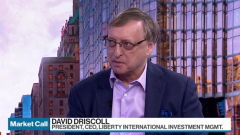Jun 6, 2024
A Trader’s Guide to China EV Stocks as EU Tariff Deadline Looms
, Bloomberg News

(Bloomberg) -- If the European Commission imposes a 20% or higher tariff on Chinese electric vehicles, their market penetration could be slowed, analysts said ahead of an expected announcement of provisional duties next week.
At that level, Chinese carmakers can hike prices and still stay competitive though profits per vehicle may well halve, according to Morgan Stanley. Analysts expect the EU to raise tariffs to between 15% and 30%, from 10% now.
The additional levies will be another hurdle for EV makers such as BYD Co. and Zhejiang Geely Holding Group Co., which are engaged in a vicious price war in China and effectively blocked from exporting directly to the US. Sales of higher-margin cars overseas have been a crucial strategy and selling point for investors in their stocks.
“The question is less on their existing share in Europe and more on how a higher tariff can be tackled,” said Christina Woon, a portfolio manager at Eastspring Investments SP Ltd.
The stocks have had a weak start to 2024, with Li Auto Inc. and XPeng Inc. down more than 40% each, while BYD has risen about 7%. The Hang Seng Index is up 8.4% year-to-date.
China sold $11.5 billion of EVs in 2023 to the EU, accounting for almost 40% of imports in the bloc. The region accounts for as much as 30% of BYD’s total exports, about a third for Geely, and most of Xpeng Inc.’s sales, according to Morgan Stanley. Tesla Inc.’s factory in China is the biggest exporter.
Read: Xi’s China EV Dream Came True. 10 Years On, Walls Are Going Up
Here are things for traders to watch:
Tariff Levels
Morgan Stanley’s global auto team expects the EU to hike tariffs for Chinese EV exports to 20% from the existing 10% level and say investors they spoke to eye a range of 15% to 30%. The Rhodium Group projects 15% to 30% while Citigroup Inc. expects 25% or 30%.
If that predicted tariff range comes to pass, “the exports of Chinese battery-electric vehicles to the market would then decrease by 15% to 30%,” said Dong Jing, an analyst at Shanghai-based consultancy Gasgoo International, citing calculations based on consumption elasticity.
Targeted Companies
The EU has selected three companies for further scrutiny: BYD, Geely and SAIC Motor Corp. BYD is one of the world’s largest EV makers and SAIC owns the British-origin MG brand, whose EV models are popular in Europe. Individual duties will be calculated for the three automakers.
Other exporters, like Tesla, will receive a tariff rate based on the weighted average of the duties imposed on Chinese brands that have cooperated with the investigation.
Carmaker Strategy
The momentum of China’s EV exports to the EU could hit “a speed bump” with the potential tariff increase and if automakers decided to raise average selling prices, according to Morgan Stanley.
“Assuming 20% EV tariff hikes, some carmakers we talk to might consider introducing 5% to 10% average selling price hikes,” Morgan Stanley analysts including Tim Hsiao wrote in a note. “With that, China-made EVs could stay price-competitive. Although unit profitability for most OEMs’ exports may be halved in that case, vehicle profit could still be five to seven times higher than on domestic sales.”
Producers like BYD have relied on higher-margin exports to help cushion profit hits from a persistent price war in China. The Shenzhen-headquartered company has a goal of selling 500,000 vehicles outside China this year, and then doubling that in 2025.
Chinese Reaction
After the Chinese carmakers are notified of the provisional duties this month, the EU will accept comments before implementation in July. The final tariff rate is due to be set in November, before which Chinese authorities and manufacturers can continue to negotiate with the European officials.
The Chinese government’s response following the EC decision next week is also in the spotlight. China signaled last month that it’s ready to unleash tariffs as high as 25% on imported cars with large engines, which would affect European car makers such as Mercedes-Benz Group AG and BMW AG.
--With assistance from Chunying Zhang.
©2024 Bloomberg L.P.





